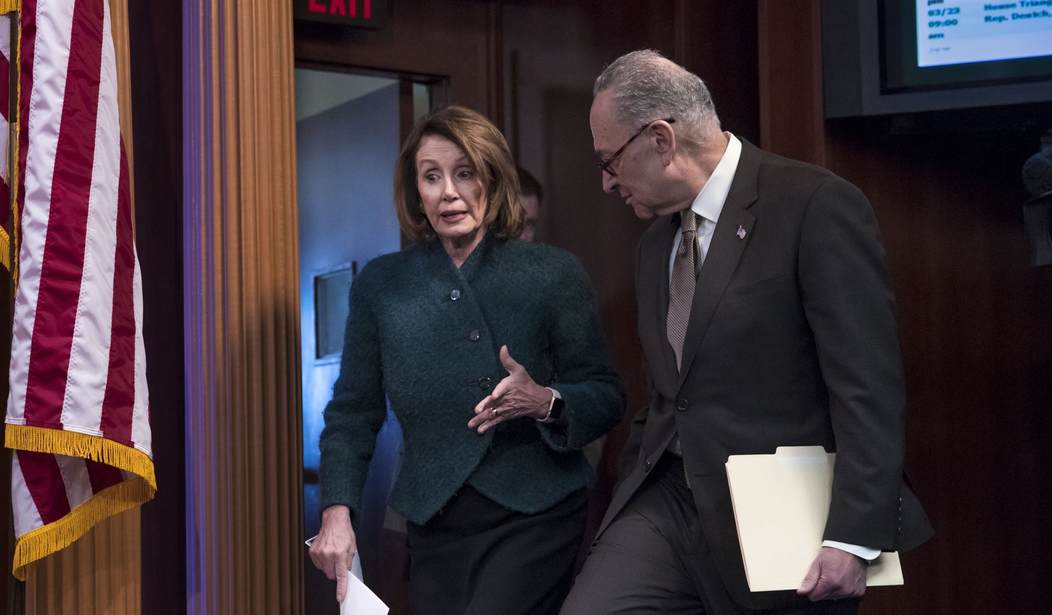Look, I get it: After winning a brutal political fight, the victorious side wants to bask in the glow for a little while and savor the moment. It's human nature. It's therefore understandable to see Republican voters high-fiving over Justice Kavanaugh, not to mention the lowest national unemployment rate since the late 1960's. The country -- by some key measures -- is thriving, the GOP controls all three elected elements of the federal government (plus most states), and conservatives are making a lasting mark on the federal judiciary. Having defeated the Left repeatedly in recent years, some conservatives may be inclined to believe that another surprise victory is in the cards for early November. Not so fast. The expectation that the polls will again be wrong, and that a red wave might be forming, is a dangerous form of optimism.
It is possible that Democrats' gains will fall short of the margin they'll need to retake the House of Representatives, but that strikes me as unlikely. History is very much on the Democrats' side (just as historical trends were an under-appreciated wind at Donald Trump's back two years ago), their voters are exceptionally motivated (even considering the new surge among GOP voters, which may or may not last), and reporting and anecdotes like this cannot be shrugged off. The truth is that while Republicans may be in decent shape to hold, or even build upon, their majority in the Senate, the House is looking eminently winnable for the opposition. Why? The suburbs and swing districts appear poised to swing left this year. Consider this polling from the Washington Post, some of which was in the field prior to the Kavanaugh battle reaching its fevered zenith:
Key Graf: pic.twitter.com/4yjntnp6Dv
— Guy Benson (@guypbenson) October 8, 2018
A few more notes from the data:
The president’s job approval rating among likely voters in these battleground districts stands at 43 percent, somewhat higher than a national rating of 38 percent among registered voters in a Post-ABC News poll taken at the end of August. In those battleground House districts that he carried, Trump’s approval is 46 percent; in the Clinton-won districts, it is 38 percent. Overall, 47 percent of voters in all of the competitive districts strongly disapprove of the way he is handling his job. A recent analysis by Public Opinion Strategies, a Republican polling firm, concluded that Republicans would need a national Trump approval rating of at least 45 percent to have a chance to maintain control of the House....The new survey finds considerable optimism about the economy, with 77 percent giving the economy positive marks — 27 percent rating it “excellent” and 50 percent saying it is “good.” But when asked about the direction of the country apart from the economy, 36 percent say the country is going in the right direction and 57 percent say things are headed in the wrong direction.
Recommended
More than three-quarters of voters in these battlegrounds rate the economy positively, yet the president's strong disapproval rating stands at 47 percent. That's a worrisome disconnect for the GOP. If Democrats simply capture roughly three-quarters of the 21 Clinton-won districts, and one-fourth of those 48 Trump-carried districts, they'll take the gavel. But the average generic ballot is almost dead even within the four dozen Trump districts, meaning that substantial gains are well within reach for Team Blue. If this ends up being a cascading wave year, we won't be talking about whether Democrats can manage to eke out 24 gains on election night; we'll be wondering whether the over/under should be set somewhere closer to 40 seats. Don't forget the important data points of off-year and special election results and trends we've already seen. Of course it's conceivable that Republicans will cheat history and outperform the polls on November 6th. But the far greater likelihood is that Democrats will have a good night.
The only way to put a damper on that good night is for Republican voters -- especially Trump-skeptical suburbanites and women -- to tap into the motivation they felt during the Kavanaugh brouhaha and surprise the experts with robust turnout. And with that, having performed my wake-up call duties, I'll leave you with three indicators that suggest a decent showing remains in the realm of possibility for Republicans:
UPDATED: NRCC low-dollar fundraising facts over the last week (10/1-10/5)
— Matt Gorman (@mattsgorman) October 6, 2018
Total Raised ?? 418%
Individual Donors ?? 273%
Donations ?? 279%
Average Donation ?? 149%
This SCOTUS fight energized the GOP base and they’re ready to vote.
North Carolina 9, final. Harris (R) 47, McCready (D) 42
— Nate Cohn (@Nate_Cohn) October 5, 2018
Again, feels like part of a pattern of GOP consolidating a bit in Trump/Romney-type conservative districts https://t.co/8G0BHhmQLz
Trump Job Approval
— Political Polls (@Politics_Polls) October 5, 2018
Among Adults:
Approve 47%
Disapprove 51%
.
Among RV:
Approve 48%
Disapprove 51%@SurveyMonkey/@axios 10/3-4https://t.co/JCS97drpsG
If GOP voters are engaged down the home stretch, Republican candidates keep consolidating support in traditionally red districts, and Trump's overall approval rating is in the mid-40's, the midterms could turn into another nightmarish frustration for Democrats. But that would require a lot of 'ifs' to align.

























Join the conversation as a VIP Member